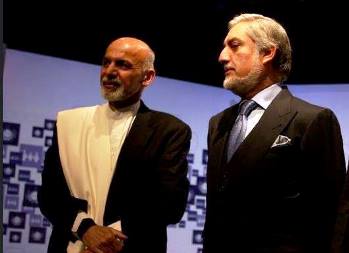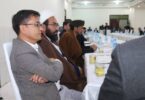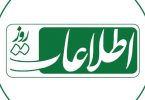
Before June 14, the runoff election day, Abdullah Abdullah – the front runner in the first round of the presidential elections in Afghanistan – looked more confident than his rival, Ashraf Ghani Ahmadzai.
Abdullah believed he would receive the majority of the votes in the runoff. His second vice-president Mohammad Mohaqqiq, claimed that their team would receive at least 70 percent of the total votes.
Abdullah had received 45 percent of the total votes in first round elections held on April 5 and Ghani received around 31 percent. So, Abdullah needed only 5 percent for victory in the runoff, whilst Ghani needed around 19 percent.
Abdullah also had gained the support of three powerful presidential candidates who had lost the election in the first round; former foreign minister Zalmai Rassool, influential Jihadi leader Abdurab Rasool Sayyaf, and former governor of Nangarhar and Kandahar provinces Gul Agha Sherzai. Between the thereof them, they had received more than 20 percent of the total votes.
Ghani was also being supported by three losing candidates; Qutbuddin Helal, a top member of Hezb-e-Islami of Gulbodin Hekmatiar; Daud Sultanzoi, a former MP; and Hedayat Amin Arsala. These three candidates received less than 4 percent of the initial vote.
Also around 200 parliamentarians who represent different ethnic groups of Afghanistan endorsed Abdullah in the second round, whereas only 161 endorsed Ahmadzai.
Furthermore, increasing the amount of polling stations was in Abdullah’s benefit. The Independent Election Commission (IEC) opened around 2,500 new polling stations in all 34 provinces. It had the potential to provide more votes for Abdullah in the second round as tens of thousands of the voters mainly in the capital, northern, western, and central provinces faced shortage of ballots in the first round.
Abdullah had received 45 percent of the total votes in first round elections held on April 5 and Ghani received around 31 percent. So, Abdullah needs 5 percent for victory in the runoff, whilst Ghani needs around 19 percent.
A shortage they didn’t face in the runoff. Mr. Abdullah received the highest numbers of votes in 19 provinces which are located in the mentioned provinces in the first round, but Mr. Ahmadzai was on the top in 14 provinces mainly located in east and south which didn’t face the ballot shortages in the first round.
Remarkably, even weather changes were in favour of Abdullah, during the first round the weather in most of the 19 provinces – where Abdullah was on the top – was cold and these provinces faced heavy rain, even snowfall; whilst most of the 14 provinces where Ghani was on the top didn’t face adverse weather conditions.
Despite the above mentioned facts in his favour, Abdullah had raised serious concerns in regards to fraud, President Karzai’s intervention in the election, and the impartiality of the two election commissions. He had expressed deep dissatisfaction even when he started his election campaign in the first round. Since then, he repeated several times in public addresses that he didn’t have any serious rivals at all, and that his only rival was ‘fraud’.
As June 14th rolled around and the runoff was contested, his concerns proved not to be unfounded. An unexampled incident occurred on the runoff election day which changed many things and made the prediction about the winning candidate difficult. Even worse, this incident may push the country to the brink of another major crisis.
Scandal
Less than one hour before closing time for voting, Kabul Police Chief General Zahir Zahir accused the Independent Election Commission (IEC) Secretariat Chief Zia-ul-Haq Amarkhail of committing a big and systematic fraud in favor of Ahmadzai.
Abdullah also had gained the support of three powerful presidential candidates who had lost the election in the first round; former foreign minister Zalmai Rassool, influential Jihadi leader Abdurab Rasool Sayyaf, and former governor of Nangarhar and Kandahar provinces Gul Agha Sherzai. Between the thereof them, they had received more than 20 percent of the total votes.
Gen. Zahir claimed that IEC Secretariat Chief attempted to steal ballots from the IEC’s headquarters to use them for one of the two presidential candidates. According to him, vehicles belonging to Amarkhail were stopped by police officers while trying to leave the headquarters with extra ballots stowed inside them and his bodyguards threatened the police officers when they stopped the vehicles. Zahir also added that the fraud had been underway since a night before voting day.
Although thousands of IEC employees were accused of committing frauds and illegal actions during the first round and more than five thousands of its personals were blacklisted, this was the first time a high ranking official of was charged with systematic frauds. Amrkhail is the second highest ranking member of IEC.
Meanwhile, Mr. Amarkhail rejected these allegations and claimed that the ballots were needed for some voting centers in Sorobi, a district in the outskirts of Kabul City that was allegedly facing a shortage of ballots. He condemned the police force’s action against him and called it ‘illegal’.
The situation became even more sensitive when the minister of interior Umar Daudzai and the chairman of IEC Ahmad Yousuf Nuristani suggested that this incident was likely the result of a ‘misunderstanding’. Mr. Nuristani rejected all the allegations against Amarkhail.
Abdullah reacted to this seriously. He delivered an impassioned speech at a press conference on Sunday, June 15. Mr. Abdullah demanded Amarkhail’s suspension from his job and a full investigation regarding his involvement in electoral fraud, otherwise Abdullah stated that he would not accept the results of the election.
When Abdullah was asked about President Karzai’s impartiality during the 2014 election process (first round and runoff), he indirectly rejected Karzai’s neutrality and said the Afghan people knew everything in this regard and that it was up to their judgment.
He also added that he would not accept results from the provinces where the turnout is more than the numbers of eligible voters.
Ghani was also being supported by three losing candidates; Qutbuddin Helal, a top member of Hezb-e-Islami of Gulbodin Hekmatiar; Daud Sultanzoi, a former MP; and Hedayat Amin Arsala. These three candidates received less than 4 percent of the initial vote.
Meanwhile, Abdullah’s first vice-president, Mohammad Khan, claimed that the results from some provinces – such as Paktia, Paktica and Nangarhar – showed a turnout which was more than the number of eligible voters and, in some of them, was more than the whole population of the province. He then demanded re-election in these provinces and transparency in the balloting process.
Furthermore, the commander of the 23th Corps of Tandar accused the district governor of Barmal in Paktika province along with five electoral officials for stuffing boxes on the eve of the runoff election. The commander claimed he had enough evidence to prove this allegation.
The election monitoring organizations – including Transparent Election Foundation of Afghanistan (TEFA), Free and Fair Election forum of Afghanistan (FEFA), Election Watch Organization (EWA), and Afghanistan Democracy Watch (ADW) – also claim that fraud took place during the runoff election. They demanded IEC to investigate all the fraudulent cases, including Amarkhail’s case and Barmal’s case.
The Independent Complaint Commission (ICC) also announced that the number of complaints against IEC’s staff – for their illegal actions during the runoff – was higher than all the other categories.
On the other side, Ashraf Ghani Ahmadzai and his electoral team remained optimistic about the runoff election and criticized Abdullah’s speech against Amarkhail. Faizullah Zaki, a member of Ghani’s team said on Monday June 16, that his candidate would accept the results of the runoff election and there were less fraudulent cases compared to the first round. He blamed Abdullah for attempting to discredit the election.
In this situation, President Karzai and Independent Complaint Commission (ICC) can play key roles by replacing Mr. Amarkhail with a person who is reliable for both candidates. ICC should investigate all the fraudulent cases – including Amarkhail’s case and Barmal’s case – impartially and fairly.
Mr. Zaki added that the IEC’s secretariat chief’s suspension is not acceptable to Ghani’s team. He suggested that Abdullah’s team can register their complaints through a legal procedure, if they have evidence.
Ashraf Ghani Ahmadzai and his team also criticized Kabul police for its action against Amarkhail and called it ‘illegal’. If this confrontation between the two political teams continues, Afghanistan will face a new big crises and this election may not have a winner in the scheduled time by IEC. Even more, ethnic tensions would raise and the country would go toward a civil war.
To avoid new crises, both sides should find a solution. Instead of accusing and blaming each other and using poisoning words, they should start negotiation to find a common point to break this deadlock and bring transparency to the election.
Actually, one of the two candidates has lost his trust in IEC and he believes that IEC is backing his rival. He believes that this election wasn’t transparent and fair.
In this situation, President Karzai and Independent Complaint Commission (ICC) can play key roles by replacing Mr. Amarkhail with a person who is reliable for both candidates. ICC should investigate all the fraudulent cases – including Amarkhail’s case and Barmal’s case – impartially and fairly.
Although, news on Amarkhail’s suspension has been posted on Facebook and Twitter pages by some journalists and civil society activists, the news has not been confirmed yet by any official authority.










Leave a Comment